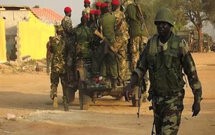 While South Sudanese rebel leader Riek Machar claims to be marching on Juba, the South Sudanese military has actually been making strides that will probably prevent the rebels from immediately threatening the capital. Now that peace talks have finally begun in Addis Ababa, foreign actors will be pushing hard for a cease-fire.
While South Sudanese rebel leader Riek Machar claims to be marching on Juba, the South Sudanese military has actually been making strides that will probably prevent the rebels from immediately threatening the capital. Now that peace talks have finally begun in Addis Ababa, foreign actors will be pushing hard for a cease-fire.
Though delegations from both sides have been present in the Ethiopian capital for several days, mediation did not get underway until Jan. 3. No direct talks have yet taken place between representatives of Machar and South Sudanese President Salva Kiir Mayardit.
Instead, mediators from the Intergovernmental Authority on Development (an East African trading bloc consisting of South Sudan, Kenya, Uganda, Sudan, Ethiopia, Djibouti and Somalia) have been holding separate consultations with representatives from both sides ahead of planned direct talks on Jan. 4.
The main item on the agenda is the installation of a monitored cease-fire, which would buy time for mediation to resolve political tensions. The South Sudanese government had already agreed to a cease-fire but rebels have continued to fight. The rebels took control of Bor on Jan. 1, possibly to reinforce their position in negotiations. Machar has also demanded the release of 11 political allies arrested during the crisis, but the South Sudanese government has only committed to releasing some of them so far.
While Machar is now claiming his rebels will march on Juba, South Sudanese forces have been able to push back rebel units south of Bor and are preparing a counteroffensive to retake the city. This should keep Machar's forces from immediately threatening Juba at the same time that pressure to reach a cease-fire agreement would be rising in Addis Ababa.
Uganda, Kenya and Ethiopia declared earlier that they might launch a military intervention if Machar did not agree to a cease-fire by Dec. 31. However, recent events could make the Ugandan government reluctant to increase its direct involvement.
Ugandan President Yoweri Museveni has also come under harsh criticism for his decision to deploy forces to Juba. Though they were initially deployed to assist in the evacuation of Ugandan citizens, the political opposition in Uganda is now demanding answers over their continued deployment. It is possible they were sent to directly support Kiir.
Despite continuing combat around Bor on the path to Juba, the situation in South Sudan's northern oil producing states has not changed since oil production in Unity state was shut down. Oil companies in the state halted their operations and evacuated foreign personnel, stopping crude production of about 40,000 barrels per day.
However, the larger share of South Sudan's production continues in Upper Nile State, which continues to produce around 200,000 barrels per day. Neither side currently has an interest in disrupting oil production, though if peace talks were unsuccessful and the crisis evolved into a protracted internal conflict in South Sudan, Machar's rebels could attempt to cut off the government in Juba from its oil revenues.
The violence has also prompted the U.S. Embassy to continue evacuating government personnel from the country. Non-critical personnel were already evacuated, and the embassy will now halt all but its emergency services in order to remove the majority of the remaining personnel. This could indicate that the United States is not confident that violence will not spread to Juba.
However, Washington has been prudent in dealing with the risk to its diplomatic post in Juba, especially in light of the Benghazi attack. U.S. Marines specializing in the protection of diplomatic posts have been positioned in Djibouti to allow for a quick intervention if the security situation in Juba should deteriorate, while a smaller number of Marines had previously been deployed to reinforce the embassy in Juba.
The South Sudanese military has reportedly been able to hold back rebels as they try to advance south of Bor, allegedly positioning its own troops for an offensive to retake Bor. While the exact balance between Machar's forces and those of the government near Bor is unclear, it does seem that government forces have been able to interdict the advance of rebel forces toward Juba for now.
If Machar's rebels, belonging to the Nuer tribe, were to move closer to Juba, they would also be moving farther from the areas predominantly inhabited by Nuer people and would likely encounter greater resistance from local Dinka populations supporting Kiir's government.
Courtesy : Stratfor (www.stratfor.com)